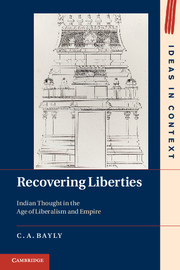Book contents
- Frontmatter
- Contents
- Preface
- Note on Indian names
- Introduction
- Chapter 1 The social and intellectual contexts of early Indian liberalism, c.1780–1840
- Chapter 2 The advent of liberalism in India
- Chapter 3 The advent of liberal thought in India and beyond
- Chapter 4 After Rammohan
- Chapter 5 Living as liberals
- Chapter 6 Thinking as liberals
- Chapter 7 Giants with feet of clay
- Chapter 8 Liberals in the Desh
- Chapter 9 ‘Communitarianism’
- Chapter 10 Inter-war
- Chapter 11 Anti-liberalism, ‘counter-liberalism’ and liberalism’s survival, 1920–1950
- Conclusion
- Glossary
- Select bibliography
- Index
Preface
Published online by Cambridge University Press: 05 June 2012
- Frontmatter
- Contents
- Preface
- Note on Indian names
- Introduction
- Chapter 1 The social and intellectual contexts of early Indian liberalism, c.1780–1840
- Chapter 2 The advent of liberalism in India
- Chapter 3 The advent of liberal thought in India and beyond
- Chapter 4 After Rammohan
- Chapter 5 Living as liberals
- Chapter 6 Thinking as liberals
- Chapter 7 Giants with feet of clay
- Chapter 8 Liberals in the Desh
- Chapter 9 ‘Communitarianism’
- Chapter 10 Inter-war
- Chapter 11 Anti-liberalism, ‘counter-liberalism’ and liberalism’s survival, 1920–1950
- Conclusion
- Glossary
- Select bibliography
- Index
Summary
This book examines the ideas, projects and sensibilities of those Indian intellectuals and public figures who broadly subscribed to the international liberal consensus of the nineteenth and early twentieth centuries. It represents an extension forward in time of my earlier work Empire and information (1996) to the high point of India’s struggle for freedom. It also raises the issue of the creation and circulation of knowledge to a more abstract level by examining political arguments on their own terms. The subtitle of the book is a tribute to Arabic thought in the liberal age, by Albert Hourani, who was one of the finest historians of the later twentieth century. Hourani made it clear that his own book could not possibly engage with the whole of ‘Arabic thought’ over 150 years. Equally, the present work cannot hope to capture even a small part of the vast and complex intellectual history of India between 1800 and the 1950s. Inevitably, it is extremely selective. It concentrates on Bengal, Bombay and north India and there is little on Madras and the south, which produced its own powerful school of liberal thinkers. In order to break down the simple dichotomy between metropolis and periphery, however, some chapters briefly consider analogous liberal projects in Ceylon (Sri Lanka) and the Sino-Malay world. The sections on Indian Muslims are brief and mainly designed to show that the category ‘liberal’ can also be applied, with some reservations, to many Muslim intellectuals.
Again, most of the texts, pamphlets and newspapers cited here were initially written in English, though I have referred to some Hindi materials in the sections on north India, since the ‘vernacularisation’ of liberal concepts remains an important issue. Anindita Ghosh has also very kindly read and commented on the sections on Bengal from her knowledge of the vernacular literature and provided some references from Bengali sources. The heavy concentration on English materials can be justified to a considerable extent because Indian liberal thinkers were attempting to create a national and transnational ‘republic of letters’ and also to bring their concerns and formulations to the attention of their British rulers and to American and wider European opinion through their command of the English language. Again, the focus of the work remains on liberal thinkers, broadly defined, though at points it examines the arguments of their opponents amongst British and Indian radicals or conservatives. The book concludes with a discussion of the decline and transformation of liberal thinking after 1914 and the manner in which some classic liberal ideas were taken up by Indian socialists, champions of the disadvantaged, followers of Gandhi and even theorists of the Hindu right.
- Type
- Chapter
- Information
- Recovering LibertiesIndian Thought in the Age of Liberalism and Empire, pp. vii - ixPublisher: Cambridge University PressPrint publication year: 2011

